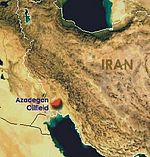|
Energy
Japan's Inpex Rewarded and Removed from Iran Sanction List
Friday, November 19, 2010

Tokyo - The U.S. Department of State said that Japanese major oil company Inpex Corporation is removed from the U.S. sanctions' list targeting companies dealing with Iran.
In a press release, Secretary of State Hillary Clinton said that Inpex Corp. is removed from the list of entities subject to U.S. investigation under the Iran Sanctions Act "because the company has withdrawn from a development project in the Azadegan oil field" in Iran.
The State Department called Inpex's withdrawal a "meaningful step" and said that because the Japanese company pledged it "will not engage in any energy-related activity in Iran in the future that could result in sanctions under the Iran Sanctions Act ... the secretary does not regard Inpex as a company of concern for its past Iran-related activities."
The release also claimed that "as recognized in UNSCR 1929, Iran potentially uses revenues derived from its energy sector to fund its proliferation-sensitive activities."
Inpex has also pledged not to engage in any energy-related activity in Iran in the future that could result in sanctions under the U.S. act against the Middle East country's nuclear program, the department noted. It added that "as long as Inpex continues to act in accordance with its pledge, the department will not regard it "as a company of concern for its past Iran-related activities."
The United States and European Union passed sanctions in July that target the Iranian energy sector to force Tehran to accept their demands over its nuclear activities. Japanese government led by Democratic Party of Japan followed suit in September.
The US government has asked Japan in October to completely withdraw from the Iranian Azadegan oil development field in the southwestern part of Iran, where Japan holds about 10% in stakes.
Inpex, expectedly, announced in October that it was abandoning its shares' at the Azadegan oil field near the Iranian border with Iraq. The field has estimated reserves of 33.2 billion barrels of oil.
Some Japanese MPs and officials in the energy sector expressed concerns that "the country's energy security might have been compromised by abandoning Azadegan."
Iran provided 10,7% of total Japanese crude oil imports last September and Iranian oil officials played down the impacts of Inpex withdrawal from their country.
Iranian diplomats, meanwhile, advised the Japanese officials "to observe moderation in their relations with Iran and do not join the illogical pressures exerted by the US and the EU on Tehran."
PanOrient News
© PanOrient News All Rights Reserved.
|

